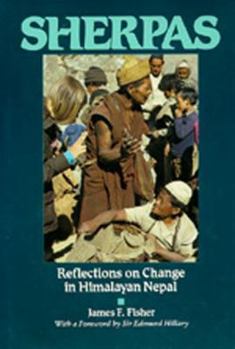Sherpas: Reflections on Change in Himalayan Nepal
Select Format
Select Condition 
Book Overview
James Fisher combines the strengths of technical anthropology, literary memoir, and striking photography in this telling study of rapid social change in Himalayan Nepal. The author first visited the... This description may be from another edition of this product.
Format:Hardcover
Language:English
ISBN:0520067703
ISBN13:9780520067707
Release Date:May 1990
Publisher:University of California Press
Length:205 Pages
Weight:0.78 lbs.
Dimensions:9.5" x 0.8" x 6.3"
Customer Reviews
2 ratings
Knows Sherpa economy and values
Published by Thriftbooks.com User , 25 years ago
James Fisher worked with Edmund Hillary in the early 1960's to establish the early Sherpa schools in Khumjung and Jung Gompa (Junbesi) as well as the medical supplies landing strips at Lukla and Phaplu. Thus he learned first hand the basics of Sherpa culture and economy; he had a good working understanding of Sherpa moral values, too. Returning to USA for PhD in Anthropology, Prof. Fisher developed a theoretical understanding of human society. He then coupled theory with his practical knowledge of Sherpa life, and did several outstanding studies of Sherpa culture which ask the right questions of the appropriate spokespeople resulting in culturally accurate answers. Sherpa Friendship Association always recommends Sherpas: Reflections on Change as the first book anyone should read to answer the vital questions: what is happening to Sherpa society now? Is Sherpa religion dead? Have Sherpa values collapsed into generic materialism? Many folks recently returned from Himalayan trekking or those studying vajrayana buddhism, as well as Sherpa leaders, are very concerned to find these answers. You will find Prof. Fisher's answers accurate and positive, because he does not ask random informants (or informants with mischievious motivation) like many other anthroplogists who go on to write books on Sherpas. Essentially, Fisher's interviews show that Sherpa culture remains vibrant, moral, and strongly religious. Great book, highly recommended!
An Excellent Insight on the Sherpas of Nepal
Published by Thriftbooks.com User , 25 years ago
A very informative and readable book. The author provides a thoughtful and moving account of the Sherpas and how their community is being transformed by the forces of modernization. The book is well-researched, thorough, and balanced. The author's personal accounts and anecdotes that cover a quarter of a century, complemented by excellent photographs, are particular strengths. Excellent reading for anyone with an interest in the Sherpas of Nepal.






